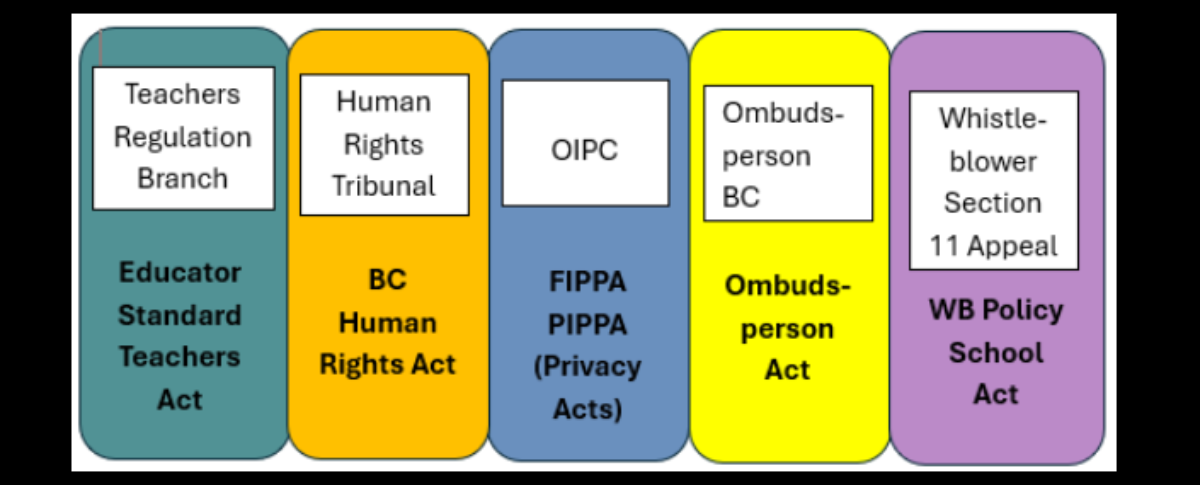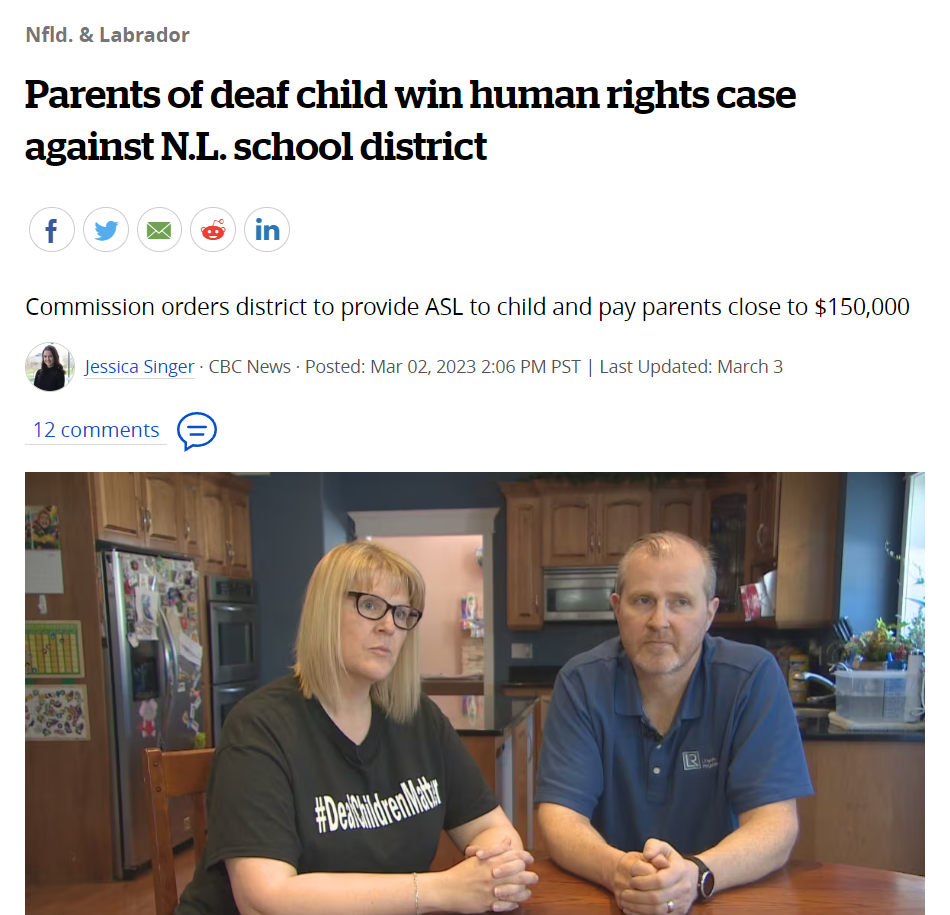A and B obo Infant A v. School District C (No. 5), 2018 BCHRT 25
I have heard of many families in very complex situations. Parents/guardians are struggling with accepting/agreeing to accommodations offered by the school that they feel very strongly won’t work. If you are thinking that the human rights process is a process you might be considering, there are important things to note.
I have pulled the paragraphs/parts of paragraphs from this case that I feel are important for simplicity. I highly encourage people to read the full case to understand the context of everything and how a hearing and the Human Rights Code are applied. It is a layered case and the complexity of the situation is something many families can find themselves in.
I’d like to also note, that even though we are reading this case, there might be information that is not written about that this family may feel is very important that was left out.
Let’s look at the issues this case brings up and how we can be prepared for them.
Some of the topics this case brings up are:
- The importance of documentation and having as much evidence as you can.
- Witness testimony from parents and education staff (credibility conflicts)
- The role and responsibilities of parents/guardians.
- The duty of parents/guardians to facilitate accommodations
- Parent/guardian credibility
- Parents/guardians duty to cooperate in good faith
“If the School District initiated a reasonable proposal that would, if implemented, accommodate the Child, then the Parents were obliged to facilitate that proposal. Failure to do so is fatal to their complaint of discrimination.”
DIRECTLY FROM THE CASE:
[37] I am entitled to accept some, none or all of a witness’ testimony. Where there was disagreement in the evidence, my findings and reasons are set out. Where necessary to do so, I have assessed credibility and considered factors such as the witness’ demeanour, powers of observation, opportunity for knowledge, judgment, memory, and ability to describe clearly what they saw and heard….(continues)
[38] In resolving conflicts in the evidence, and determining whether to accept the evidence of any witness, in whole or in part, I have adopted and applied the test set out in Bradshaw:
Credibility involves an assessment of the trustworthiness of a witness’ testimony based upon the veracity or sincerity of a witness and the accuracy of the evidence that the witness provides. The art of assessment involves examination of various factors such as the ability and opportunity to observe events, the firmness of his [or her] memory, the ability to resist the influence of interest to modify his [or her] recollection, whether the witness’ evidence harmonizes with independent evidence that has been accepted, whether the witness changes his [or her] testimony during direct and cross-examination, whether the witness’ testimony seems unreasonable, impossible, or unlikely, whether a witness has a motive to lie, and the demeanour of a witness generally. Ultimately, the validity of the evidence depends on whether the evidence is consistent with the probabilities affecting the case as a whole and shown to be in existence at the time. (Bradshaw, para. 186, citations excluded)
[39] I find that the most helpful evidence in this case is the documentary evidence created at the time of events…(continues)
[42] I have assigned relatively little weight to the Mother’s evidence where it conflicted with the first-hand accounts given by the School Counsellor, Principal, Vice Principal, and Teachers H, M, and G. I have found the Mother’s hearsay evidence considerably less reliable than the direct evidence of reliable witnesses, where there is a conflict.
[43] The Mother acknowledged that she was probably not present for most of the incidents at school that involved her Child. At times, she had a hard time recalling events. For example, the Mother’s testimony on the psychoeducational assessment of her son was wrong by one year. She acknowledged that she was “out a year”. The Mother testified that there is no reason to dispute the emails that were authored by her at the time. The Mother testified “that is what I wrote at that time”.
[44] During cross-examination, the Mother responded to several questions regarding her testimony about her Child’s version of events by saying that she did not know or was not there. She acknowledged that most of her knowledge of the incidents came through her Child. I find that her son was more likely than not motivated to minimize his involvement in some incidents when reporting them to his Parents, so as to avoid discipline. For example, the Mother described disciplining the Child in relation to an incident where he swore at the Principal. She described their punishment as “Draconian”. (In retrospect, the Mother regretted using that word in her letter). As another example, regarding the November 2016 Incident, the Child only reported to his Parents that he grabbed another student by the collar, whereas I find, as a fact, that the Child choked a student, pushed him over a railing, and spat in his face.
(Parents’ Obligations (Paragraph 248-260) ** Important to read in the case. This case was dismissed and discrimination was not found. )
[258] In summary, the evidence shows that the accommodation process of the Child at school was often frustrated by the unreasonable actions or inactions of his Parents. The Parents did not attend re-entry meetings after the Child was sent home from school; the Parents attended the first IEP meeting, but refused to attend future IEP meetings. After November 2015, the Parents stopped providing comments to draft IEPs that were sent to them for review. The Parents refused to participate in the creation of a Safety Plan for the Child. The Parents did not provide the requested medical and psychological information to enable the School to modify the Child’s IEP. The Parents rejected the Principal’s offers of an educational assistant, classroom change, pod change, and school change. The Parents interfered with and rejected the psycho-educational assessment performed by a school psychologist. The Parents opposed any involvement of the District’s Intensive Behavioural Team with the Child. The Parents refused to allow an educational assistant to work with the Child despite it being recommended by his teachers, School Counsellor, and Principal. In a letter dated May 2016, the Parents wrote that the Principal was the “root cause of all this mess”.
[248] The School District is not the only party with obligations in the accommodation process. Rather, the parents were obliged, as the Child’s representatives, to work towards facilitating an appropriate accommodation: Central Okanagan School District No. 23 v. Renaud, 1992 CanLII 81 (SCC), [1992] 2 SCR 970. If the School District initiated a reasonable proposal that would, if implemented, accommodate the Child, then the Parents were obliged to facilitate that proposal. Failure to do so is fatal to their complaint of discrimination.
Again, I highly encourage everyone to read the full case. I appreciate every family who has taken their case to the human rights tribunal hearing level. Even cases that have not “won” are still beneficial. It is through their experiences and stories that the rest of us learn and therefore become better advocates for our children to navigate this current system.
TAKE AWAY LEARNING
Whether this is fair or unfair/just or unjust/right or wrong…to uphold a human rights complaint…this is what I take away from this case.
- We need to be so thoughtful in how we communicate with the school.
- We need to be solution focused.
- Our credibility just like the staff’s credibility may be a part of the hearing process if there are issues around credibility and the relationship with the school.
- We need to document everything and gather as much evidence as we can.
- We need to cooperate and facilitate accommodations and if they are not successful, document the failure. (Paper documentation, video, etc)
- We need help. We should seek guidance and advice from as many professionals and other advocacy support people as possible if we find ourselves in a challenging advocacy situation at our child’s school.
However, it is also important to be aware.
"Parental conduct or lack of parental authority cannot be used as a justification for not meeting an exceptional student’s needs;"
To view the document on CanLII’s website:
L.B. v. Toronto District School Board, 2015 HRTO 1622 (CanLII)
"a parent’s “fierce advocacy” for his or her child must not and cannot prevent a school board from accommodating the child’s needs to the point of undue hardship."
[77] The Interim Decision sets out my reasons for issuing an order with respect to the first two points, as follows:
(a) School boards have an obligation under the Code to accommodate their students with disabilities to the point of undue hardship, regardless of whether the students are receiving any medical treatment in the community or not;
(b) School boards cannot order or demand of parents to place their children into residential psychiatric treatment programs and cannot deny or withhold accommodations to the point of undue hardship on the grounds that the student should be in such a program. While I have no evidence to show that this was the case here, that does not alter the principle;
(c) School boards have an obligation under the Education Act to provide appropriate special education placements, programs and services to their exceptional students. Parental conduct or lack of parental authority cannot be used as a justification for not meeting an exceptional student’s needs; and
(d) I agree with the decision in R.B. v. Keewatin-Patricia District School Board, (R.B./Keewatin) 2013 HRTO 1436, an HRTO decision cited by both parties in this case, at para 265, that a parent’s “fierce advocacy” for his or her child must not and cannot prevent a school board from accommodating the child’s needs to the point of undue hardship.
Here is the link to the case in full: https://canlii.ca/t/gmd68
For more updated human rights process information please click on my Human Rights Tribunal page and scan down to the “Things that are not explicitly explained but are good to know…”
For more information on understanding the duty to accommodate.
I offer an Education/Human Rights Workbook to parents/guardians. Hopefully, this process can help clarify your case.
I wish you all the best,


